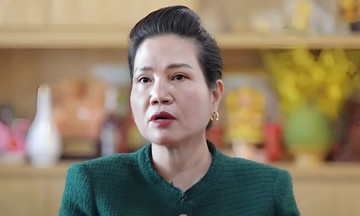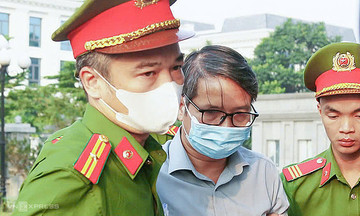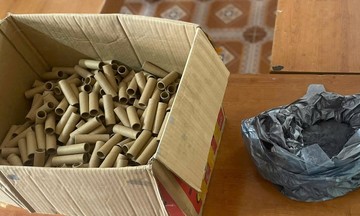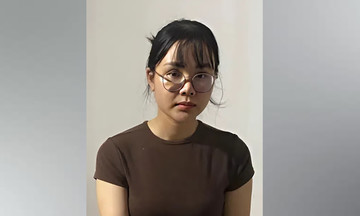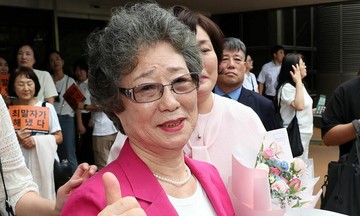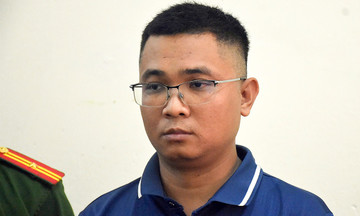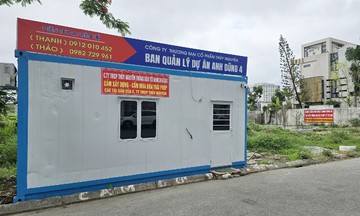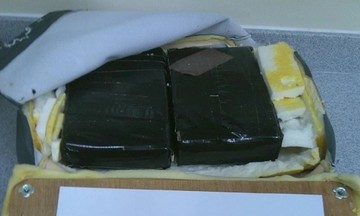Approaching a red light, Zhang’s father swerved to avoid two cars before colliding with an SUV and a sedan, ultimately crashing into a concrete median. The February 2021 accident in Henan province left her parents with concussions and hospitalized for 4 days, according to medical records.
Zhang, stunned, stared at the deflated airbags in front of her. She and her young nephew in the backseat were unharmed.
Tesla, the electric vehicle company led by billionaire Elon Musk, is known for its all-electric vehicles. The company is a pioneer in battery technology, autonomous driving, and a global charging station network. Tesla not only manufactures cars but also shapes trends in clean energy and intelligent transportation.
The 'brake failure' dispute
Traffic police determined Zhang’s father was at fault for not maintaining a safe distance. However, Zhang insisted the brakes malfunctioned, causing the loss of control. She filed a complaint with the local market regulator, demanding a refund and compensation. Zhang requested the automaker provide complete pre-crash data from her car, hoping it would explain the incident. Tesla refused.
"Tesla employees were arrogant and made it difficult to resolve my complaint. I was incredibly angry," Zhang said in an interview.
Weeks later, she draped a banner reading "Tesla brake failure" over her damaged car in front of a Tesla dealership in Zhengzhou, the capital of Henan province, about 200 km from her home. She sat on the car’s roof with a loudspeaker, shouting: "Tesla Model 3 brakes failed. A family of 4 almost died".
The following month, she parked her wrecked car outside an auto show in Zhengzhou.
All to no avail. Tesla refused to provide the complete data, and mediation went nowhere.
Believing that Tesla’s senior executives would attend an April 2021 auto show in Shanghai, Zhang and a friend, who had also experienced a problem with their Tesla, wore matching "Brake Failure" t-shirts to the Tesla booth, determined to speak with executives. Zhang recounted that the executives avoided them, and they couldn't persuade anyone to listen.
Her friend, 6 months pregnant at the time, shouted: "Tesla's brakes failed!". Zhang climbed atop a display car and also began shouting.
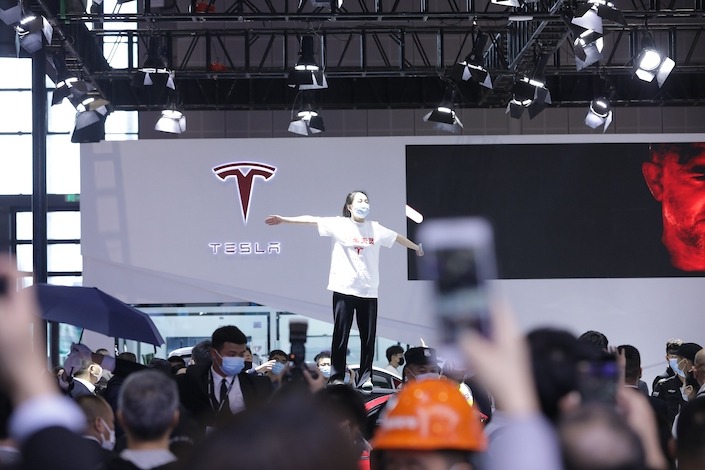 |
Zhang Yazhou climbs on a display car at the Shanghai Auto Show, 4/2021. Photo: Caixin |
Zhang Yazhou climbs on a display car at the Shanghai Auto Show, 4/2021. Photo: Caixin
The moment, captured on cell phones by numerous onlookers, quickly went viral on Chinese social media. Security personnel dragged Zhang away, and she was subsequently detained for 5 days.
Tesla alleged Zhang’s actions were staged, not spontaneous. A senior Tesla executive speculated to Chinese media that Zhang "had someone behind her" and was creating a scene to secure a larger compensation payout.
Meanwhile, Zhang maintained her actions were an impulsive outburst of anger. She sued Tesla for defamation, arguing the executive’s comments unfairly portrayed her as a troublemaker to deflect attention from the company’s own shortcomings.
But then, Zhang found herself the defendant in a lawsuit filed by Tesla.
Three lost lawsuits
Tesla claimed Zhang intentionally spread false information, damaging its brand, and sought 5 million CNY (684,000 USD) in damages.
The court accepted the case in 10/2021. At the time, Tesla faced mounting criticism in China as dozens of car owners publicly complained about brake failures, battery fires, unintended acceleration, and other defects. The same month as Zhang’s accident, Chinese regulators summoned Tesla to address quality concerns stemming from such reports.
Under regulatory pressure, Tesla released data from Zhang’s car. According to the company, Zhang’s father was driving at nearly 120 km/h, and the braking system had activated, mitigating the impact.
However, Tesla publicly released the data, including Zhang’s license plate number. She said she and her family faced online threats and doxing. Moreover, she questioned how she could be sure Tesla hadn’t altered or edited the data from her car.
Zhang sued Tesla a second time, in 3/2022, for privacy violation.
She lost both lawsuits against Tesla.
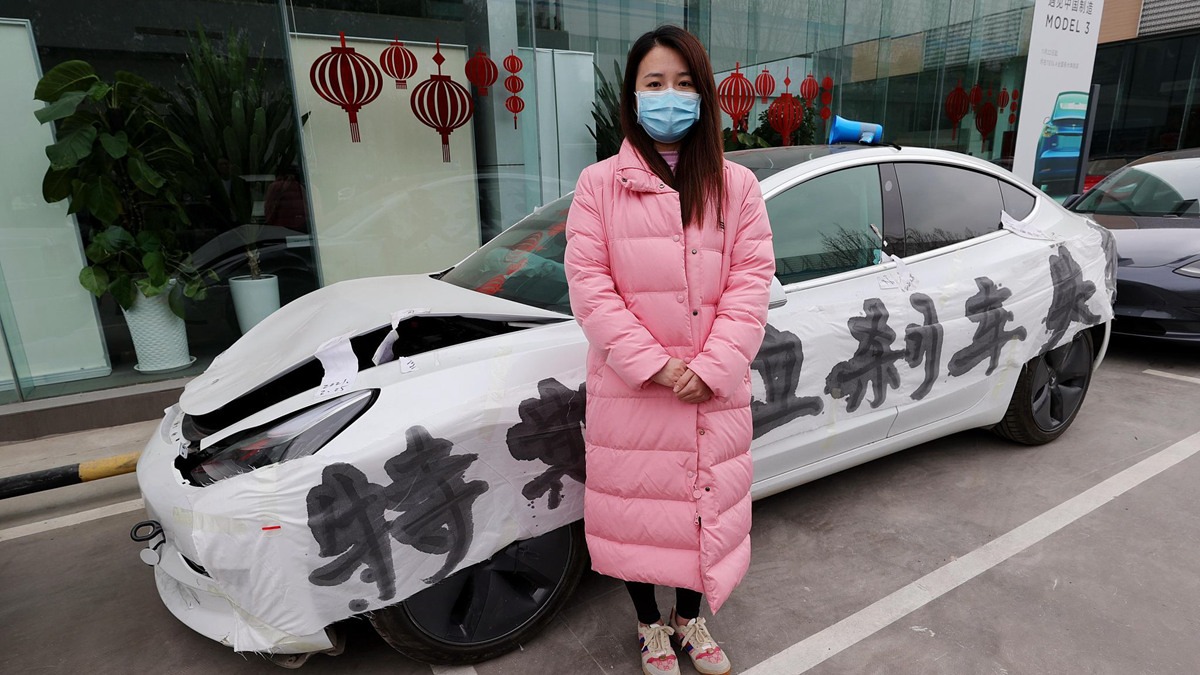 |
Zhang stands in front of her damaged Model 3, plastered with signs reading "Tesla's brakes failed," outside a Tesla dealership in Zhengzhou, Henan province, on 10/3/2021. Photo: CFP |
Zhang stands in front of her damaged Model 3, plastered with signs reading "Tesla's brakes failed," outside a Tesla dealership in Zhengzhou, Henan province, on 10/3/2021. Photo: CFP
Back in court as the defendant in Tesla’s defamation suit, Zhang couldn't prove her Tesla’s brakes had malfunctioned.
In a closed-door May 2024 trial in Shanghai, the court ruled Zhang’s public complaints exceeded reasonable and factual criticism and ordered her to issue a public apology and pay Tesla 170,000 CNY (23,000 USD) for damages and legal fees.
Zhang appealed. She argued her actions were a call for transparency and accountability, and that a powerful and wealthy company like Tesla should accept legitimate criticism from customers.
"I refuse to accept the outcome. As a consumer, even if I'm wrong, I have the right to comment and criticize. I expressed my feelings as a car user. This has nothing to do with damaging their reputation," Zhang said.
The Shanghai High People's Court said the ruling was the result of a fair trial based on objective facts, without any "special treatment".
Tesla wins 90% of lawsuits against media, bloggers
Zhang’s chances of winning her appeal are slim. Some automotive industry experts in China believe customers often face an uphill battle in lawsuits against companies.
The Chinese government’s publicly available online court records database shows 81 civil judgments where car owners sued Tesla over safety issues, quality concerns, or contract disputes. Car owners prevailed in only 9 cases. This means Tesla has won nearly 90% of these civil lawsuits.
Zhang is not the only one Tesla has taken to court. In the past 4 years, Tesla has sued at least 6 car owners in China over complaints about quality or accidents they attributed to mechanical failures.
Based on a review of public court documents and Chinese media reports, Tesla has also sued at least 6 bloggers and two Chinese media outlets for critical articles.
Tesla won all 11 cases. Two rulings, including Zhang’s, are under appeal. One case was settled out of court.
Among them, Musk’s company sued media outlets PingWest and ifeng.com for negative coverage. They took issue with a PingWest article that declared Tesla’s Shanghai factory a "sweatshop." The news site ifeng.com drew Tesla’s ire for an article about the plight of car owners battling Tesla. PingWest issued an apology and paid Tesla 100,000 CNY (13,700 USD). The outcome of the ifeng.com lawsuit is unclear.
Feng Shiming, an automotive blogger and Tesla owner, was ordered by a Shanghai court to pay Tesla 250,000 CNY (34,200 USD) in 2024 after writing about Tesla's alleged brake failures. Feng has appealed. According to Feng, Tesla aims to intimidate people into silence regarding any negative comments about the company.
Similarly, Chen Junyi claimed his Model 3's brakes failed, causing him to lose control and crash into dozens of other cars in a parking lot at high speed in 8/2020. Chen said he suffered a broken back, 4 broken ribs, and had 30 cm of his small intestine removed. He took to social media, warning people against buying Teslas, lifting his shirt to reveal a long, jagged scar running down his stomach.
Meanwhile, Tesla insisted the accident was Chen's fault, citing a technical assessment showing the car had accelerated and not braked in the seconds before the crash. The company sued Chen for making false statements.
A Chinese court ordered Chen to apologize and pay the automaker 50,000 CNY (6,800 USD).
"I deeply regret the negative, serious impact I have caused on Tesla and their cars. I sincerely apologize to Tesla and those who have been misled by my statements," Chen wrote. However, a month later, Chen said the apology wasn't his.
According to SCMP, one of the few instances where a customer won against Tesla in China was in 2021, when a Beijing court ruled Tesla had committed fraud by selling a used Model S, previously involved in a serious accident, to a driver named Han Chao. The court ordered Tesla to compensate Han 155,000 USD—three times the original purchase price.
After losing the case, Tesla countersued Han for defamation, seeking 650,000 USD, claiming his social media posts damaged the company's reputation. The lawsuit has not reached a final verdict.
In the US, Tesla also faces numerous customer complaints and lawsuits related to Autopilot, battery charging, suspension problems, sudden braking or acceleration, faulty airbags, and other issues. Judges have dismissed some cases. In others, Tesla has settled out of court or paid large settlements.
Tesla has not publicly sued any customers in the US for voicing criticism, although in January, Musk said on X that it "might be time" to sue media outlets for reporting that could tarnish Tesla’s brand. His post garnered over 22 million views.
Tesla is not the only company in the industry to sue its critics. BYD has also actively pursued legal action against media outlets, including an unsuccessful suit against Vice Media in the US.
More recently, electric vehicle manufacturers Nio and Li Auto have stepped up defamation lawsuits against bloggers in China accused of spreading misinformation about the companies.
Tue Anh (according to AP, SCMP)



